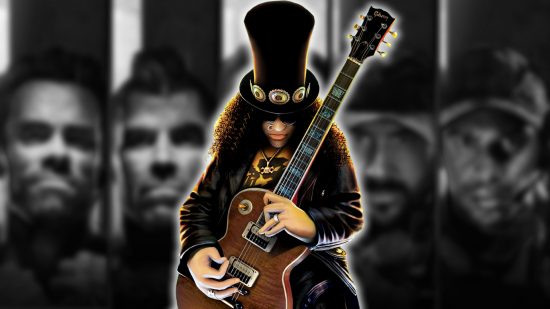Activision is focused on bringing Call of Duty games to players for eternity, but the loss of iconic franchises like Tony Hawk’s Pro Skater and Guitar Hero still stings today. Each Guitar Hero entry was more than just a rhythm game, but a direct portal into the pop-culture zeitgeist of the time it was released in. I’m ready for a new Guitar Hero game to arrive on consoles, and I’m sure the world is too.
Aside from an overwhelming adoration for movies and games, the other passion of my life bestowed upon me by my older brother is music. Growing up in a household where albums spanning from Dean Martin’s Somewhere There’s a Someone to Oasis’s Be Here Now played made sure the musical education of my youth was an interesting one. But it was Guitar Hero where that fire, as Dave Grohl might say, burned out bright. The first Guitar Hero game was released at a pivotal point in my childhood, hitting stores in April 2006.
Months after the release of Foo Fighters’ 2005 double album In Your Honour, my annoying child voice couldn’t get enough of vocally replicating the guitar licks of Chris Shiflett and Grohl on tracks like Free Me, End Over End, and No Way Back. Though the Foo’s aren’t present in the debut Guitar Hero game, that hunger to pick up an instrument was given an outlet. Modelled after the Gibson SG, the controller only amplified my fantasies of pretending to be Jack Black in School of Rock, as opposed to AC/DC’s Angus Young. Enjoyably struggling my way through songs like Audioslave’s Cochise or Franz Ferdinand’s Take Me Out, this offered a gig ticket to myself at any time after school.

This newfound appreciation for the craft of musical creation grew further, encouraging me to dig into bands, genres, and documentaries I’d never thought to explore before. But the release of Guitar Hero 3 Legends of Rock proved to be a bittersweet moment in retrospect. After years of mimicking riffs, I was finally gifted my first guitar, an Encore Stratocaster ripoff that did the job for a new learner. Yet, the Guitar Hero franchise didn’t know it was about to change forever. Original developers Harmonix moved on to establish the rival franchise Rock Band, while Tony Hawk’s Pro Skater pioneers Neversoft developed Guitar Hero games until 2010’s underwhelming Warriors of Rock.
Harmonix continued to innovate the genre, adding new instrument peripherals like drum sets, midi guitars and keyboards into the mix. Both franchises offered a behemoth-sized library of songs, but the formula was getting stale. Interest in Activision’s other gigantic IP, Call of Duty, was just another nail in the coffin as Neversoft abandoned Guitar Hero for a short-lived run on the COD franchise. Though the remains of Neversoft bore the fruits of Infinity Ward, the abysmal offering of Guitar Hero Live buried our plastic guitars six feet under.
These days Activision is a Call of Duty factory, using all of our favourite developers to push games like Modern Warfare 2 and Warzone 2 forward through the current cycle. Sunsetting other IPs for the COD machine continues past Guitar Hero too. Vicarious Visions were made to reportedly abandon a THPS 3+4 remaster, despite the success of the excellent THPS 1+2 remaster release. That leaves EA to deliver the goods with Skate. later at some point soon, I hope.
It is about time that Guitar Hero was given a chance to redeem itself. The enhancements available through next-gen consoles are enough to pique my interest, but it’s the simplicity of bringing that brand of fun only the earliest games could conjure up. Games like Hi-Fi Rush, Beat Saber, and Metal Hellsinger might not need instrument controllers, but the DNA of Guitar Hero can be felt and seen in their more exciting moments. The thrill of keeping time accurately to the beat, pulling off masterful solos, and jamming along to my favourite songs delivers a joyous wave unlike any other in gaming.
Guitar Hero Live tried too hard to bring the aesthetic and attitude of the modern music scene to life, often coming across as inauthentic. Earlier titles revelled in gig culture, using the main menu as a canvas to detail setlists, venues, and characters in a vibrant way. You felt like you were part of a burgeoning scene ready to explode with the sound of the times. Selecting a digital guitar became a task in itself, albeit a fantastic one. Should I walk out on stage with a beaten-up Gibson Explorer? Or should I opt for a classic Gibson Les Paul?
The possibilities for Guitar Hero in this day and age are even more tantalising with the advent of PSVR 2, as the virtual stages of the world could be realised better than ever. Nonetheless, it all feels out of grasp as long as Activision zeros in its focus purely on the FPS market.
Guitar Hero games have afforded me things personally that I’ll always be thankful for. Forging friendships over bands we’d discovered in-game, learning how to play an actual guitar, and falling in love with the emotional potency of music itself are things I may never have found if not for that plastic Gibson SG. The world is ready for Guitar Hero to return, but Activision may have turned and left it for good.
